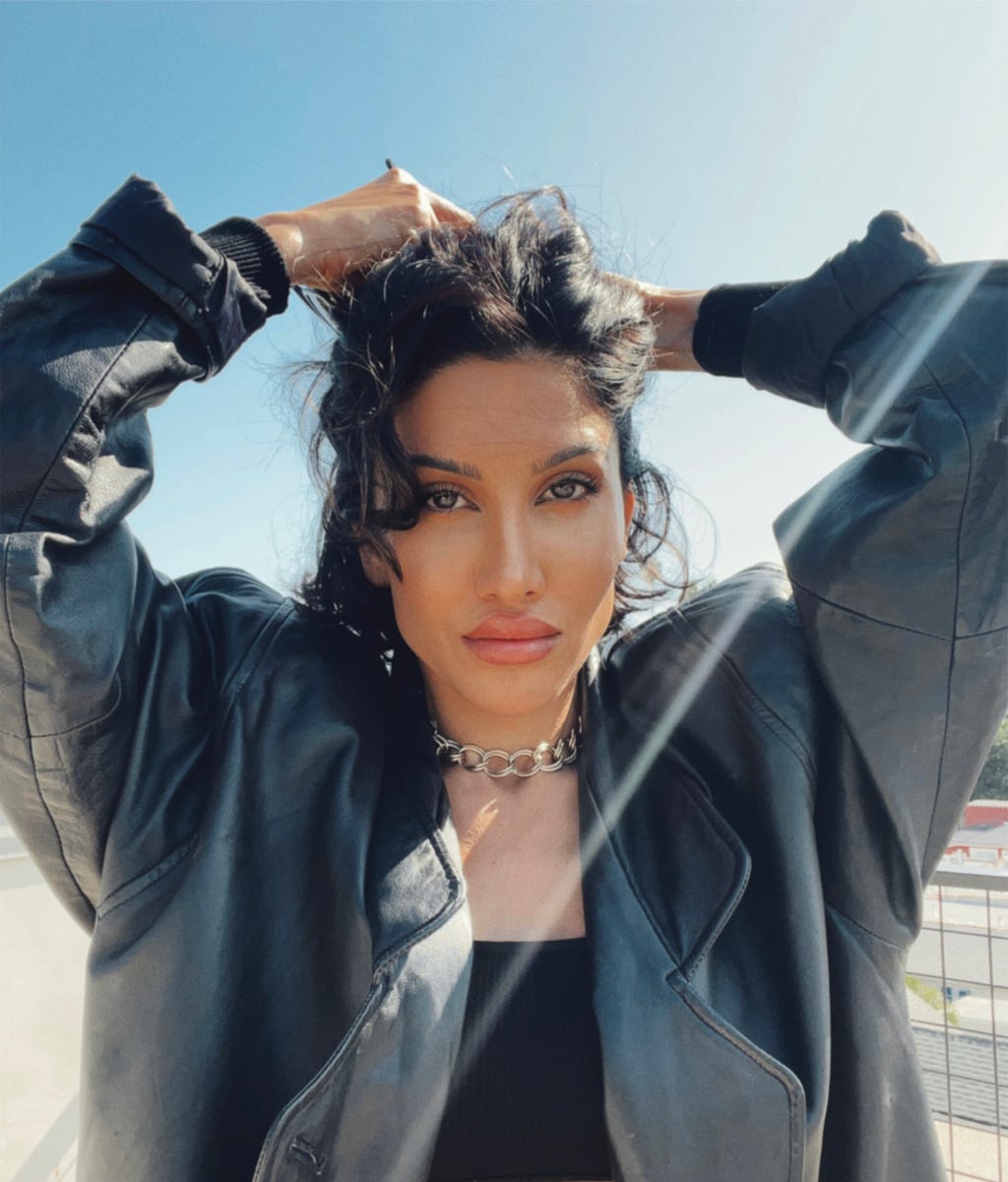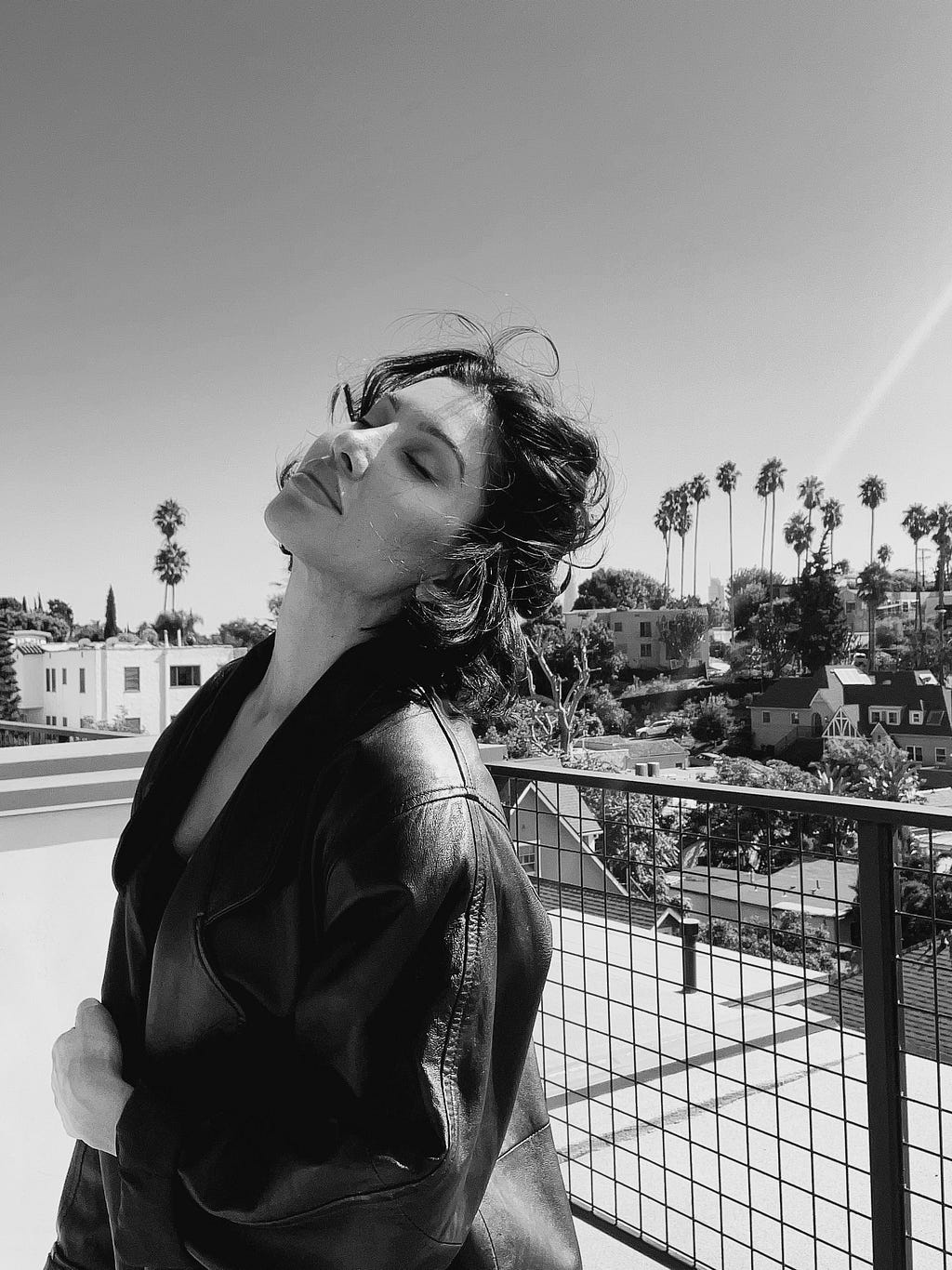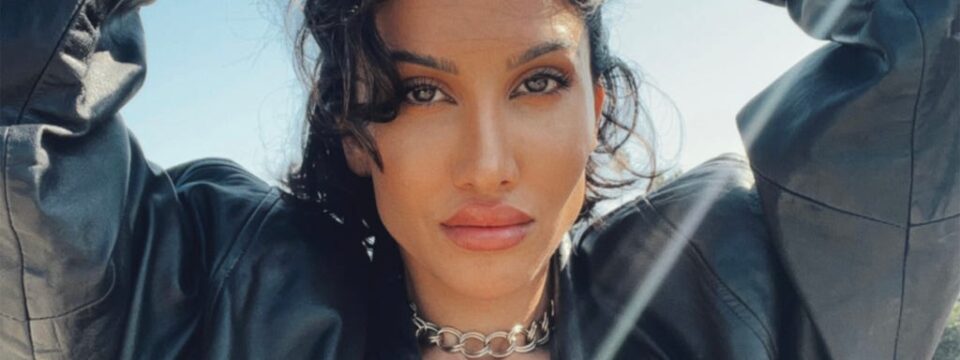
Learn how to see an idea all the way through..good or bad…just see it through and don’t regret the time spent on that idea if it sucks because there is so much to learn from what doesn’t work.
As a part of our series about “5 Things I Wish Someone Told Me When I First Became An Artist” I had the pleasure of interviewing Mina Alikhani.
Mina Alikhani stands as a testament to resilience, an artist born from the complex tapestry of life’s adversities and beauties. Her story begins in Los Angeles, where she was born into a family of Persian immigrants. In 1979, her family, seeking refuge from the tumultuous political climate under Ayatollah Khomeini’s regime in Iran, fled to the United States. Alikhani’s early life was steeped in the rich culture, politics, and history of Iran, through the narratives of three generations of her family living under one roof. Yet, this environment, while culturally enriching, was marred by personal struggles, including her father’s abusive behavior, which led her mother to leave him when Alikhani was just four years old.
Raised in a household characterized by its strict religious principles and a lack of encouragement for self-expression, Alikhani’s upbringing was far from easy. The artistic aspirations she harbored were not only discouraged but deemed impractical. Despite these challenges, or perhaps because of them, art became her sanctuary, a means of self-expression and connection to the world beyond the confines of her immediate surroundings.
Her journey into adulthood was precipitated by an early departure from home, a decision driven by the toxicity and fear that pervaded her family life. Facing homelessness and the harshest realities of survival on the streets of Los Angeles, Alikhani’s resilience was put to the test. Yet, it was through these trials that she discovered the indomitable strength within herself, a realization that she describes as part of her “hero’s saga.”
Alikhani’s entry into the world of art was less a conscious choice and more a destiny that she embraced. For her, art is not just a profession but a way of life, a means to imbue every action with creativity and meaning. Her work has become a medium through which she connects with humanity, exploring themes that resonate deeply with her and her audience. Her current series, “CRIMES AGAINST GOD,” is a bold commentary on gender apartheid, corrupt judicial systems, and the oppression faced by people in Iran, Afghanistan, and other countries under theocratic rule. Through her art, Alikhani not only reflects the times through her unique perspective but also advocates for change, challenging societal norms and injustices.
Mina Alikhani’s journey from a troubled childhood to a respected artist is a narrative of transformation and hope. Her life and work serve as a reminder of the power of art to transcend personal and collective adversity, offering a voice to the voiceless and bringing light to the shadows of society.
Thank you so much for doing this with us! Can you tell us the story of how you grew up?
I grew up in a California household of Persian immigrants. My family fled Iran in 1979 when Ayatollah Khomeini took over and came to LA to make a life for themselves. There are many stories that come to mind in answering this question…some that would make you laugh, some that would make you cry and some I’m just fully beginning to understand the impact of now that I’m “grown”.
My father was an abusive drunk and drug addict so my Mom fled that marriage when I was 4…we then moved into a house that we shared with my uncles, aunts, and grandparents…a very typical “immigrants in America scene” with a twist of gender and artistic oppression and a heavy dose of strict religious principles.
I was raised to be polite, well-mannered, hard-working, and self-sacrificing but there was no encouragement or mention of self-love, self-acceptance, or self-expression.
I certainly wasn’t encouraged to be an artist….or anything that didn’t have a guaranteed steady income attached. That being said, I learned a lot about the culture, politics, and history of Iran because I lived in a household of 3 different generations of the Iranian diaspora.
My family did the best they could however they were never able to create a healthy environment for a kid to flourish. Life in the homestead became increasingly toxic and scary so I left at a very young age (too young) and let the streets raise me. My first year on my own was rough. .I was homeless and everything I owned was in one trash bag that I carried with me from one pit spot in hell to the next. I took shelter with people in places that continued to break my spirit and make me question the purpose of my existence.
I spent most of my childhood feeling scared, ugly, worthless, unloved, and lost…and listen, yeah I know it all sounds super sad & dismal but don’t worry my story is a hero’s saga 😉 By the grace of God and the angels that have come to my aid…I’ve been able to find my way in this world.
Can you share a story with us about what brought you to this specific career path?
I don’t mean to sound vague but I think this path was predestined for me. The act of “making art” has always been a part of the way that I live. Everything I do I treat as an act of “making art”.
When I started putting my artwork out into the public eye I found that it provided an opportunity for me to connect with humanity in a way I had never experienced before. I don’t think all works of art connect us but I think that the most important art does…once that realization really sunk in for me…I knew there was nothing else I wanted to do.
Can you tell us the most interesting story that happened to you since you began your career?
The most interesting?…hmm I don’t know. I guess you could say some of the death threats I received upon putting out my REVOLUTION series were quite “interesting”. I was really surprised but also energized by the impact of my work…like damn, you really want me to die because I made this painting? Is it weird that I’m kind of flattered?
What are some of the most interesting or exciting projects you are working on now?
My current series…CRIMES AGAINST GOD. This work is an important part of my creative evolution but also an important part of my efforts in advocating for an end to gender apartheid, corrupt judicial systems and extreme oppression for the people of Iran, Afghanistan, and surrounding countries who suffer under the theocratic rule of the Islamic Republic of Iran.
Who are some of the most interesting people you have interacted with? What was that like? Do you have any stories?
Everyone and anything can be interesting as there is always something to learn when you know how to listen.

Where do you draw inspiration from? Can you share a story about that?
From within…from my journey…from having all the odds stacked against me…from surviving hell and finding heaven in tender moments…from love, from pain, and lately…I feel so inspired by the young people of Iran who fight back against their corrupt terrorist government no matter the severity of the consequences.
How have you used your success to bring goodness to the world?
I have always aimed to speak for the silenced, educate, and foster empathy through my work. I think there is “goodness” somewhere in that.
What are your “5 things I wish someone told me when I first started” and why. Please share a story or example for each.
1 . Really expensive paintbrushes don’t make better paintings.
2 . Learn how to see an idea all the way through..good or bad…just see it through and don’t regret the time spent on that idea if it sucks because there is so much to learn from what doesn’t work.
3 . Just because it’s popular doesn’t mean it’s good. Stay true to your instincts.
4 . Follow your instincts and intuition..with your work and in all things.
5 . Invest in a high-powered massage gun…long hours in the studio can be brutal on the body.
You are a person of great influence. If you could inspire a movement that would bring the most amount of good to the most amount of people, what would that be? You never know what your idea can trigger. 🙂
Hmm..how about a movement where all world leaders, humanitarian rights organizations, and everyday people come together and do whatever it takes to end gender apartheid worldwide for good.
This was very inspiring. Thank you so much for joining us!
Mina Alikhani: 5 Things I Wish Someone Told Me When I First Became An Artist was originally published in Authority Magazine on Medium, where people are continuing the conversation by highlighting and responding to this story.
